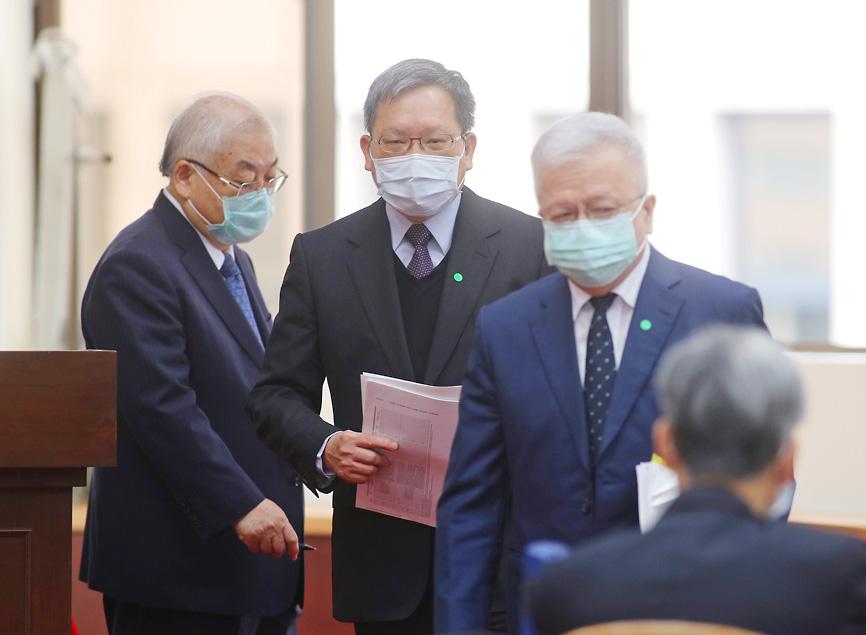The COVID-19 pandemic might persist for nine months, from an earlier estimate of three months, and would wipe out almost all economic gains this year in the absence of the government’s relief and stimulus measures, top statistics and monetary officials said yesterday.
The pandemic could erase GDP growth by 1.8 to 2.3 percentage points this year through disruptions to trade channels abroad and consumer spending at home, Directorate-General of Budget, Accounting and Statistics Minister Chu Tzer-ming (朱澤民) told a meeting of the legislature’s Finance Committee in Taipei.
That would leave Taiwan with a parlous growth of between 0.4 percent and 0.9 percent, without government intervention, Chu said.

Photo: CNA
The statistics agency in February set its forecast for GDP growth this year at 2.37 percent, with the pandemic expected to affect China for three months, based on the global experience with SARS in 2003.
However, the novel coronavirus last month rapidly spread to Europe, the US and other parts of the world, forcing world leaders to shut non-essential businesses and international travel, and impose social distancing before the development of a vaccine.
While uncertainties remain high, Chu said the Taiwanese economy could still grow between 1.3 and 1.8 percent this year, bolstered by government relief and stimulus packages.
A special aid fund of NT$60 billion (US$2 billion) has cleared the legislature and the Cabinet is to propose an extra NT$150 billion later this week to help companies and households weather the virus shock, Chu said.
The package would shore up GDP by 0.9 percentage points, he said.
The goal now is to maintain an economic expansion of at least 1 percent, instead of 2 percent as earlier forecast, provided the world could return to normalcy in the third quarter, Chu said.
The IMF forecast last week that Taiwan’s economy would contract 4 percent is excessively pessimistic and inconsistent with its projected unemployment rate of 4.4 percent, he said.
An economic decline of 4 percent would put far more people out of work than an increase of 70,000 to 80,000 as the IMF suggested, he added.
A central bank official agreed, saying the international research body had underestimated Taiwan’s economic might for years.
The IMF does not have a designated unit to study Taiwan’s economy, accounting for its lack of accuracy, central bank Deputy Governor Yen Tzung-ta (嚴宗大) said.
The global economy is most likely to stage a U-shaped recovery, but much hinges on when the virus could be brought under control, Yen told legislators.
The central bank can make quick responses if necessary after cutting interest rates by 25 basis points last month, Yen said.

In Italy’s storied gold-making hubs, jewelers are reworking their designs to trim gold content as they race to blunt the effect of record prices and appeal to shoppers watching their budgets. Gold prices hit a record high on Thursday, surging near US$5,600 an ounce, more than double a year ago as geopolitical concerns and jitters over trade pushed investors toward the safe-haven asset. The rally is putting undue pressure on small artisans as they face mounting demands from customers, including international brands, to produce cheaper items, from signature pieces to wedding rings, according to interviews with four independent jewelers in Italy’s main

Japanese Prime Minister Sanae Takaichi has talked up the benefits of a weaker yen in a campaign speech, adopting a tone at odds with her finance ministry, which has refused to rule out any options to counter excessive foreign exchange volatility. Takaichi later softened her stance, saying she did not have a preference for the yen’s direction. “People say the weak yen is bad right now, but for export industries, it’s a major opportunity,” Takaichi said on Saturday at a rally for Liberal Democratic Party candidate Daishiro Yamagiwa in Kanagawa Prefecture ahead of a snap election on Sunday. “Whether it’s selling food or

CONCERNS: Tech companies investing in AI businesses that purchase their products have raised questions among investors that they are artificially propping up demand Nvidia Corp chief executive officer Jensen Huang (黃仁勳) on Saturday said that the company would be participating in OpenAI’s latest funding round, describing it as potentially “the largest investment we’ve ever made.” “We will invest a great deal of money,” Huang told reporters while visiting Taipei. “I believe in OpenAI. The work that they do is incredible. They’re one of the most consequential companies of our time.” Huang did not say exactly how much Nvidia might contribute, but described the investment as “huge.” “Let Sam announce how much he’s going to raise — it’s for him to decide,” Huang said, referring to OpenAI

Nvidia Corp’s negotiations to invest as much as US$100 billion in OpenAI have broken down, the Wall Street Journal (WSJ) reported, exposing a potential rift between two of the most powerful companies in the artificial intelligence (AI) industry. The discussions stalled after some inside Nvidia expressed concerns about the transaction, the WSJ reported, citing unidentified people familiar with the deliberations. OpenAI makes the popular chatbot ChatGPT, while Nvidia dominates the market for AI processors that help develop such software. The companies announced the agreement in September last year, saying at the time that they had signed a letter of intent for a strategic